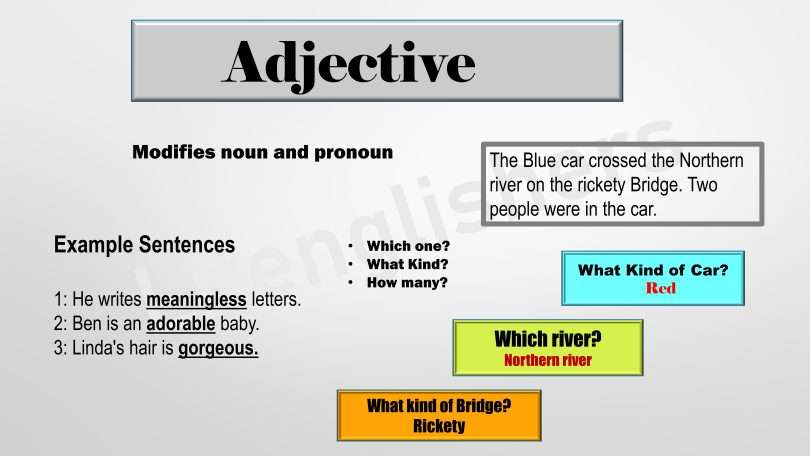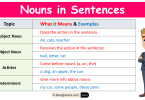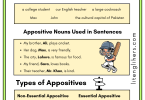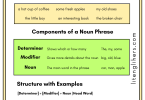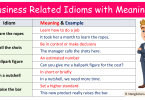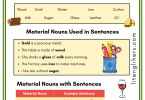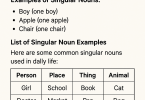Adjectives and Types
What is an Adjective?s
“The word that modifies a noun is known as an Adjective.”
Adjectives express, construe, modify, and tell us more, or gives more information about a noun. Frequently it comes before a noun.
For Example:
- Saleem is a good boy.
- He is a clever person.
- A green bottle.
| Rules | Example sentences |
| 1: Frequently it comes before a noun | A beautiful bouquet. |
| 2: At times Adjective comes after a verb | The sky becomes red. |
| 3: It can also modify pronouns. | Those are not cheaper. |
| 4: sometimes we use more than one Adjective together | A beautiful teen-aged German lady |
| 5: Some adjectives have particular endings. | Washable, childish, dirty, pretty, careless, filthy |
| 6: Most of the objectives can be comparative or superlative. | big, bigger, biggest, tall,taller, tallest Good, better, best |
Remember that adjectives can modify as well as describe other words, and you’ll find it much easier to identify different types of adjectives when you see them. Let’s have a look at the types of adjectives.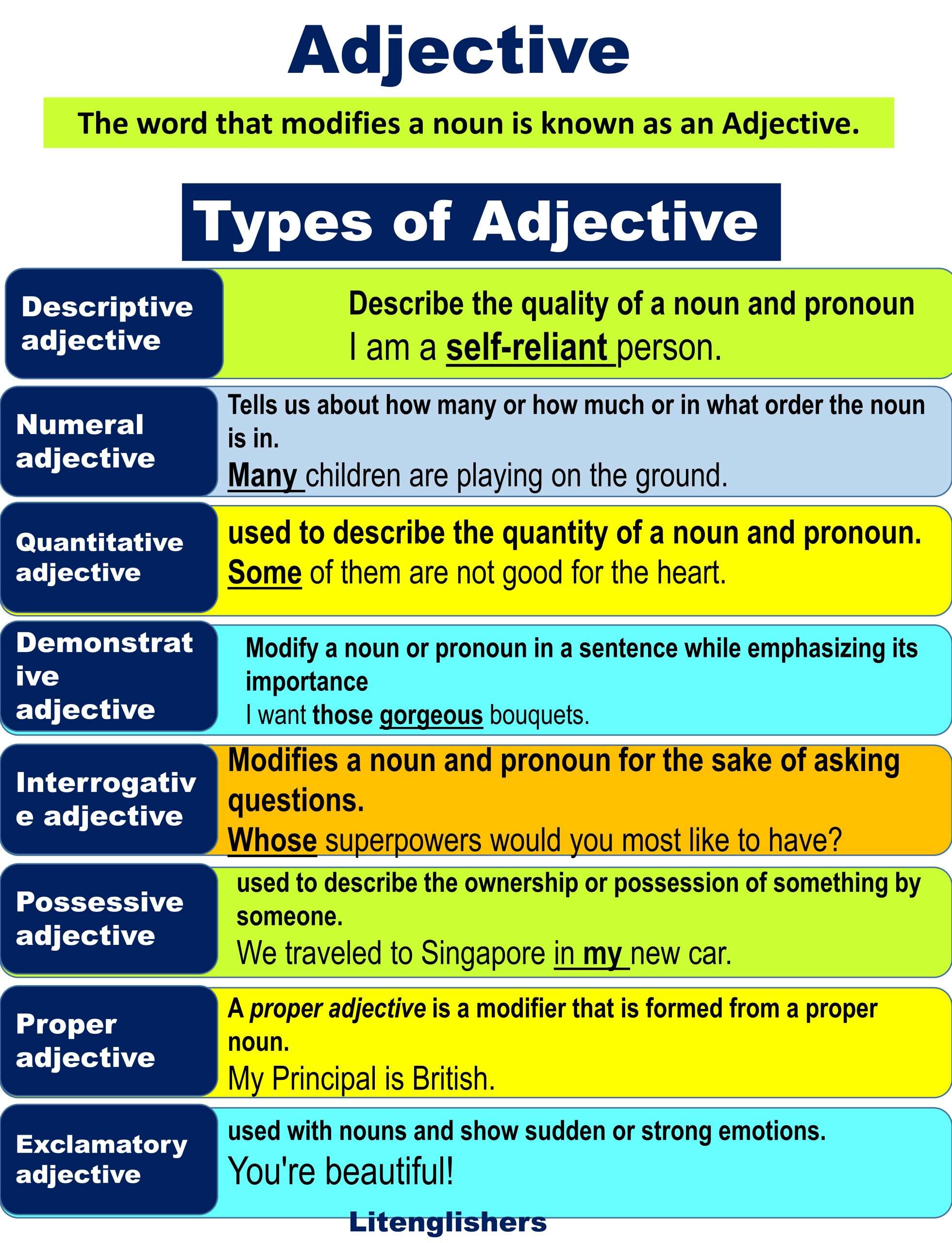 Types of Adjectives:
Types of Adjectives:
- Descriptive adjective
- Numeral adjective
- Quantitative adjective
- Demonstrative adjective
- Interrogative adjective
- Possessive adjective
- Proper adjective
- Exclamatory adjective
1: Descriptive adjectives
“Adjectives are words that describe the quality of a noun and pronoun.”
It is used to add meaning to the noun and pronouns by tellingtheirs qualities.
For Example: Charming, cruel, perfect, huge, sharp.
- I bought a genuine watch.
- I am a self-reliant person.
- He has a beautiful mother.
- She is a clever buddy.
- Give me that red big note book.
- I have an old ambulance.
- He bought an expensive luxury car.
- He gave me three pretty yellow flowers.
- I want to buy a flower necklace.
- She loves golden coins.
- I want to throw a surprise party for her.
- Give me that big green banana.
- We ate some tasty food.
2: Numeral adjectives
“Adjective that tells us about how many or how much or in what order the noun is in.”(The numbers of noun & pronoun)
For example:
- Hundred people
- Two liters
- Every human being deserves respect besides their caste and religion.
- This is all I can do to help you.
- Many babies are playing on the ground.
- The second part of this movie is thrilling.
- Three people came and robbed all the things from the house.
- Three tourists came to England from Pakistan to see queen Elizabeth II.
- There were no monkeys in this zoo.
- One player is selected as the winner of the match.
- We want some more time for the submission of the admission fee.
- There are so many ducks running after the vehicle.
- All the money you have can never buy Happiness.
- Every living thing needs water to drink.
There are three types of numeral adjectives:
- Cardinal adjectives
- Ordinal adjective
- partitive adjectives or multiples
3: Quantitative adjectives
“These adjectives are used to describe the quantity of a noun and pronoun.”
The quantitative type of adjective applies to the question statement classification like “how much or how many”. This adjective is often used to indicate the quantity or amount of substance, living belongs, or non-living beings that are mentioned in a sentence referred to as the noun or a pronoun, respectively. It doesn’t matter whether the measurement of the substance is exact or not, respectively.
For Exampl: Little, more, much, few, small, tiny, thrifty
- I have got a few pencils to start writing an essay.
- We have some idea of how to start this old vehicle.
- It requires around 25 chairs in the conference hall.
- You need to read several books for preparation.
- My best friend bought some pizzas and came to my house.
- There were so many doctors trying their level best to save that baby girl.
- Angie eats a few oranges from the dining table.
- Some of them are not good for health.
- You forget again to bring that one dress from the shop.
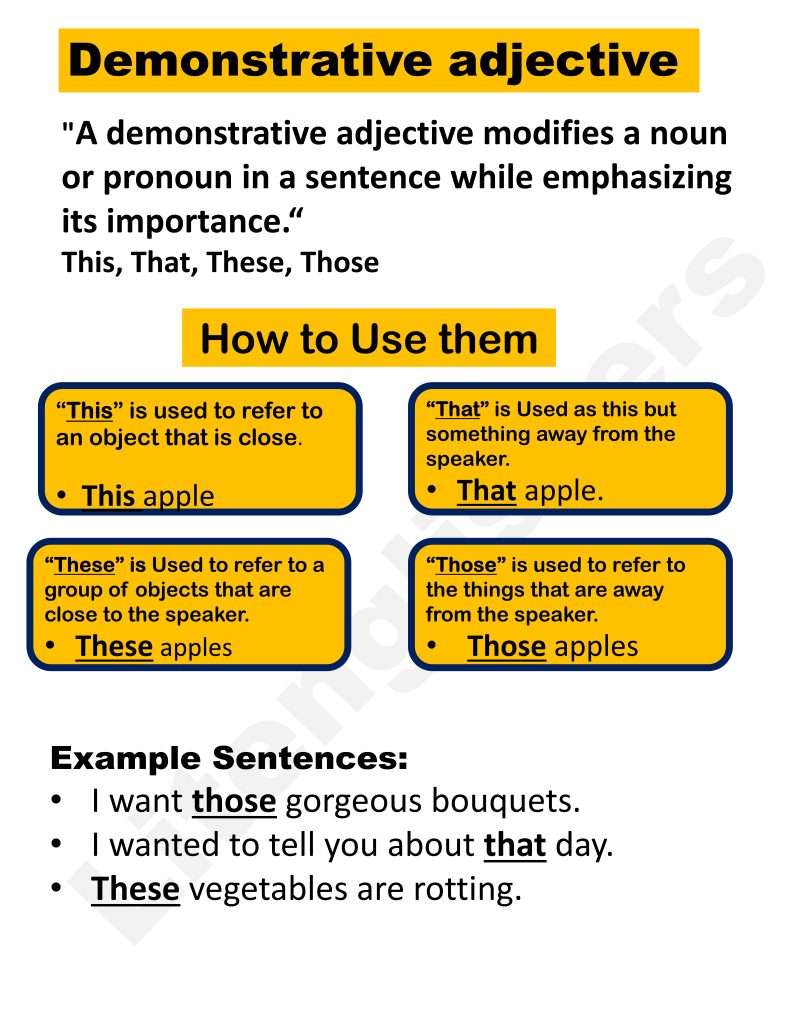 4: Demonstrative adjectives
4: Demonstrative adjectives
“A demonstrative adjective amends a noun or pronoun in a sentence while emphasizing its importance.”
For Exampl: This, that, these, those,
- I want those gorgeous plates.
- I wanted to propose to you that night.
- These cherries are smelling good.
- I can’t forget that place.
- Those people were mean to him.
5: Interrogative adjective
“Adjective that modifies a noun and pronoun for the sake of asking questions.”
For Exampl: What, whose, which
- What food have you never eaten but would like to eat?
- Which apocalyptic dystopia do you think is most likely?
- Whose superpowers would you most like to have in the future?
6: Possessive adjective
“Adjective that is used to describe the ownership or possession of something by someone.”
Example: my, your, his, her, its, our, their, whose.
- We travelled to Bangladesh in my new car.
- Did you pick up your luggage from the desk?
- My phone is broken and has to be serviced.
- Amina and I went to Karachi in her car.
7: Proper adjective
“Adjective work as a modifier that is formed from a proper noun.”
For Example:
| Proper noun | Proper adjective example | Example sentences |
| Spain | Spanish | My teacher is Spanish. |
| China | Chinese | Lets drink cofee in a Chinese cafe. |
8: Exclamatory adjective
“Adjectives that are used with nouns and show sudden or strong emotions.”
For Example:
- This puzzle is driving me up the wall!
- You’re adorable!
- It’s a boy!
- I’m going to miss this place!
Parts of speech and their Types in detail
- Noun Types
- Pronoun Types
- Adjective and its types
- Verb and its Types
- Adverb and its types
- Interjection and its types
- Conjunction and its Types
- Preposition and Its Types
